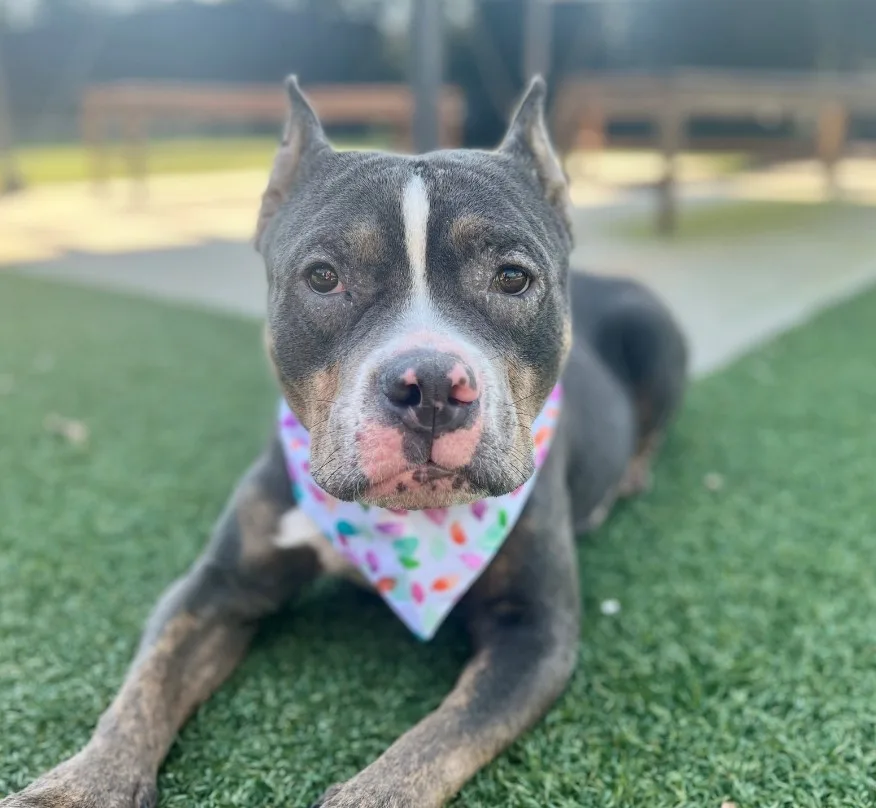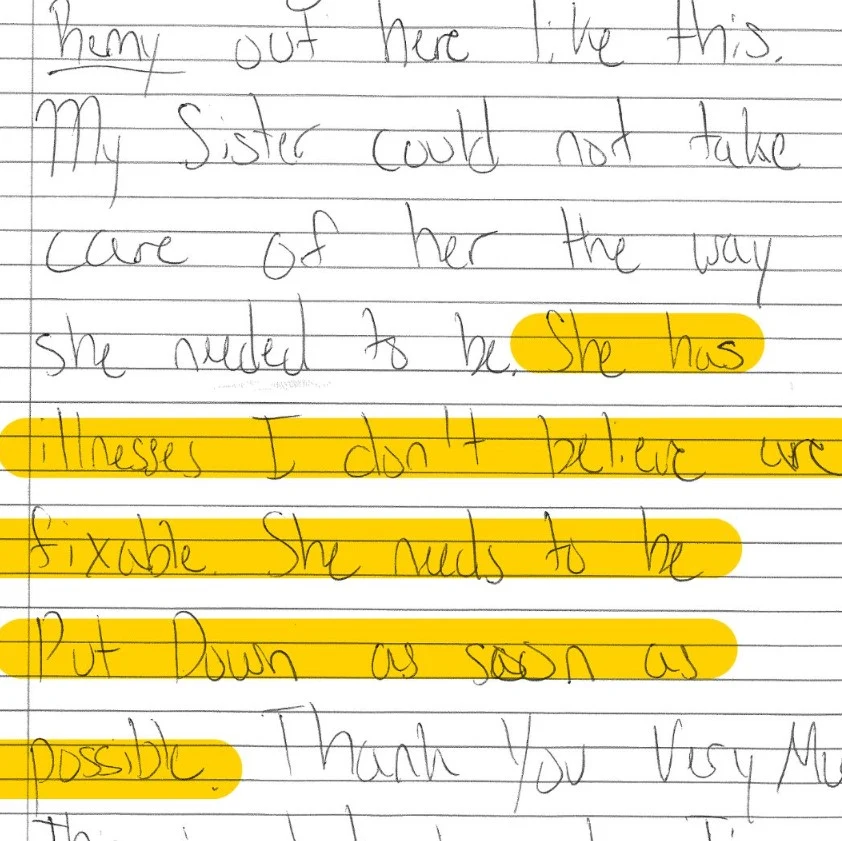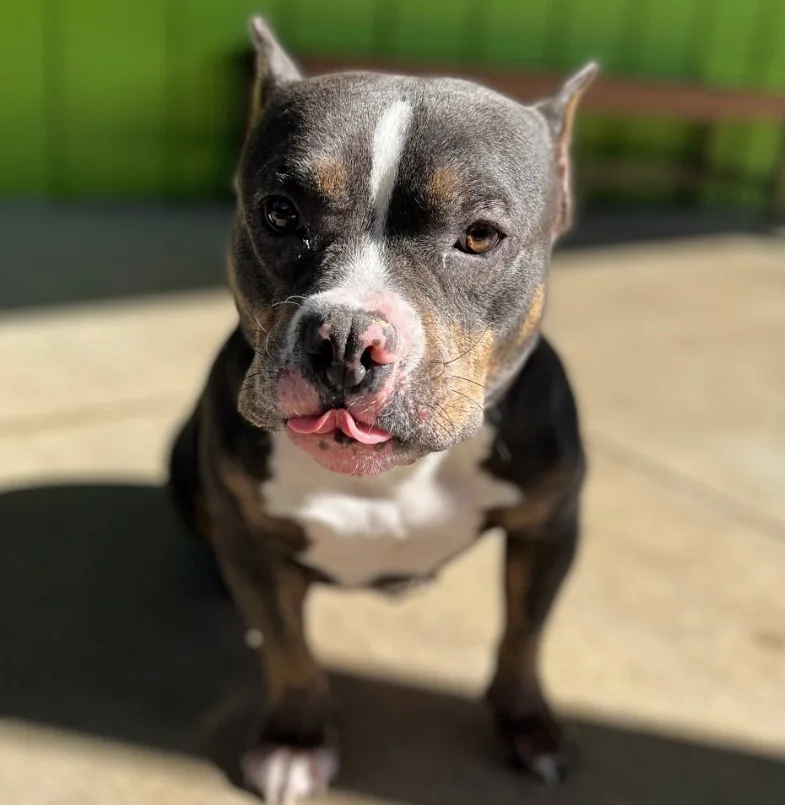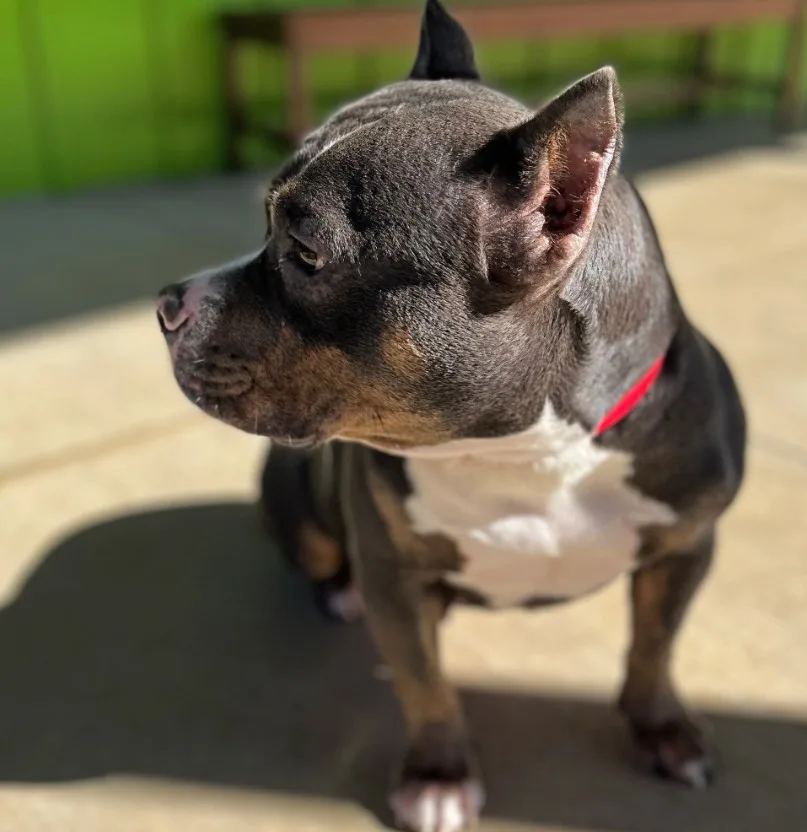When we first adopt a dog and bring him into our lives, we don’t often think about the fact that they might get sick.
Then, it inevitably happens. Sometimes, it’s just a small illness that is easily treatable, but when it’s a big problem, you don’t have many options. A lot of people can’t afford to treat dogs with serious illnesses, so they have to euthanize them to prevent any further suffering.
It’s sad and painful, but sometimes people really don’t have any options. In this story, we will talk about a dog who was seriously ill and really needed medical help.
A Heartbreaking Note

It was an ordinary day when one of the staff members working for Greenville Humane Society found a dog tied outside of their shelter in South Carolina. The person who abandoned him also left a sad note.
Remy is a Staffordshire Bull Terrier Mix who had a serious and rare heart condition that was hard to treat.
When the owner was no longer able to financially support the dog’s treatment, she was abandoned outside of the shelter.
In the note, the person said: My sister could not take care of her the way she needed to be. She has illnesses I don’t believe are fixable. She needs to be put down as soon as possible.

A local news channel, called WYFF, did a little investigating and they found that the dog was tied outside the shelter on Saturday night, and was found on Sunday.
Rachel Dalport, who works for the Greenville Humane Society, told WYFF: It was someone who truly wanted the best for her, and just didn’t know what to do.
She believed that Remy’s owner was not a neglectful one, but someone who truly cared for her and could no longer help her.
A Hopeful Look At The Future

When the shelter staff took Remy in, they discovered her illness was a grade-six heart murmur and she also had a skin issue due to malnourishment.
The Greenville Humane Society said: This serious condition will require an echocardiogram, at minimum. Depending on what is found during the procedure, Remy may require surgery or a lifelong medication regimen.
In order to help Remy, the organization set up a Hope Fund that is used not just for her, but also for treating any abandoned dog in South Carolina who needs their help.
In a Facebook statement, they said: We’ve had more sick and injured animals in our care recently than we have the funds for. We know shelters everywhere are in the same predicament.
Some time had passed and the team working to help Remy was able to provide more insight into her illness.

Apparently, what was causing her heart problems was B1 degenerative valve disease. This was somewhat good news as it meant she didn’t need any more surgeries.
However, this does not mean she is out of the woods yet. She is regularly receiving medication for her heart condition and skin problems, and the staff is hopeful that she will live a long and healthy life.
Although it’s unclear if Remy has found a new home, we at least know she is being taken care of by many wonderful people at the Greenville Humane Society who have her best interests at heart.
If you’ve ever seen your furry friend cower in fear at the sound of fireworks, you’re not alone. Dogs’ fear of fireworks is a common concern for many pet owners. The loud bangs and bright lights that accompany fireworks can trigger anxiety and stress in our canine companions. But have you ever wondered why these colorful displays in the sky can turn your pup into a trembling mess?
As a seasoned dog trainer, I’ve witnessed firsthand the impact fireworks can have on our four-legged friends. Understanding the reasons behind why dogs are afraid of fireworks is crucial in helping them cope during these noisy celebrations. So, let’s take a closer look at what might be causing this fear and how we can support our beloved pets during these challenging times.
Understanding the Fear: Why Are Dogs Afraid of Fireworks?
The Science of Canine Hearing
Dogs have incredibly sensitive hearing, often far superior to humans. This heightened sense allows them to detect sounds at frequencies we can’t even perceive. Fireworks produce loud, sudden noises at a range that can be distressing for dogs. Imagine hearing a firework explode, but magnified many times over – that’s what your furry friend experiences.
Fight or Flight: A Dog’s Natural Instinct
When dogs hear fireworks, their primal instincts kick in. They interpret the loud noises as a potential threat, triggering their fight or flight response. This survival mechanism is hardwired into their DNA. So when your canine companion cowers in fear or tries to escape the noise, it’s their way of protecting themselves from what they perceive as danger.
The Impact of Fireworks on Dogs
Physical Reactions to Loud Noises
Dogs’ acute hearing ability makes fireworks extra intense for them. The loud bangs can hurt their ears, leading to physical discomfort and distress. This heightened sensitivity to noise triggers their fight or flight response, causing anxiety and fear.
Long-Term Psychological Effects
Prolonged exposure to fireworks can have lasting psychological effects on dogs. The constant stress and fear can lead to anxiety disorders and phobias. Over time, this can significantly impact their overall well-being and behavior, affecting their quality of life.
Factors That Influence a Dog’s Fear of Fireworks
Breed and Temperament
Different dog breeds and individual temperaments can play a significant role in how they react to fireworks. Some breeds, like Border Collies or German Shepherds, known for being more sensitive, may exhibit higher levels of fear compared to breeds like Labradors or Golden Retrievers. A dog’s personality and past experiences also affect how they handle the stress of fireworks. Understanding your dog’s breed characteristics and temperament can help you better support them during these loud events.
Past Trauma and Experiences
A dog’s past trauma and experiences can greatly impact their fear of fireworks. Dogs that have had negative encounters with loud noises or fireworks in the past may develop a heightened anxiety response. Rescue dogs or those with unknown backgrounds may be more prone to fear due to previous traumatic experiences. It’s essential to consider your dog’s history and provide them with a safe and secure environment during fireworks to help alleviate their anxiety.
Ways to Comfort and Protect Your Dog During Firework Displays
Creating a Safe Space
During firework displays, creating a safe space for your dog is crucial. Choose a quiet room in your home where your dog feels most comfortable. Close windows and curtains to minimize noise and light from the fireworks. Provide familiar bedding, toys, and water in the safe space to help your dog feel secure.
Desensitization and Counterconditioning
Desensitization and counterconditioning techniques can help reduce your dog’s fear of fireworks over time. Play recordings of fireworks at a low volume while engaging your dog in a positive activity, like playing or giving treats. Gradually increase the volume over multiple sessions to help your dog associate the sounds with positive experiences.
Consultation with a Veterinarian
If your dog’s fear of fireworks is severe, consider consulting with a veterinarian. They can provide guidance on medication or supplements to help calm your dog during firework displays. Veterinarians can also offer behavior modification tips tailored to your dog’s specific needs, ensuring they feel safe and secure during stressful events.
Remember, understanding your dog’s fear and taking proactive steps to comfort and protect them during firework displays is essential for their well-being and happiness.
Preparing for Firework Events
Early Training and Socialization
When it comes to helping your furry friend cope with firework events, early training and socialization play a crucial role. Introducing your dog to various sounds and environments from a young age can help build their confidence and resilience. You can start by exposing them to recorded firework sounds at a low volume and gradually increasing it over time. This gradual exposure can help desensitize your dog to loud noises, including fireworks, making them less fearful during festive events.
The Use of Calming Aids and Products
In addition to training, you can consider using calming aids and products to help your dog stay relaxed during firework displays. Products such as anxiety vests, pheromone diffusers, calming supplements, and noise-canceling headphones can provide a sense of security and comfort to your furry companion. These aids work by promoting relaxation and reducing stress levels, making the fireworks experience less distressing for your pet. Consulting with your veterinarian can help you choose the most suitable calming aid for your dog based on their individual needs and anxiety levels.
Conclusion
Understanding why dogs are afraid of fireworks is crucial for helping them cope during festive events. Dogs’ heightened sensitivity to sound and their natural fight or flight response contribute to their fear of loud noises like fireworks. The physical discomfort caused by acute hearing ability can intensify their anxiety. Factors influencing this fear, such as past experiences and individual temperament, play a role in how dogs react to fireworks. By implementing strategies like creating a safe space, desensitization techniques, and seeking advice from a vet, you can support your furry friend in managing their fear. Preparing in advance for firework events through early training, socialization, and using calming aids like anxiety vests and pheromone diffusers can help your dog stay relaxed and feel secure during firework displays.
Frequently Asked Questions
Can fireworks cause anxiety in dogs?
Yes, fireworks can trigger anxiety in dogs due to loud noises and bright lights, impacting their emotional well-being.
Why are dogs scared of fireworks?
Dogs are scared of fireworks because of their heightened sensitivity to sound, which can lead to a fight or flight response, causing fear and distress.
What physical discomfort can fireworks cause in dogs?
Fireworks can cause physical discomfort in dogs due to their acute hearing ability, leading to stress, anxiety, and even potential hearing damage.
How can dog owners help their pets during firework events?
Dog owners can help their pets during firework events by creating a safe space, desensitization training, and consulting with a vet for additional support.
What strategies can be used to calm anxious dogs during fireworks?
Strategies like early training, socialization, and using calming aids such as anxiety vests and pheromone diffusers can help dogs stay relaxed during firework displays.
[no_toc]

Hey there, I’m Janet Brooks, a dog-loving student from California. I’m all about helping pups in need, especially those without homes. Me and my awesome friends work together to give shelter and love to stray dogs. Oh, and I also write blogs about dogs to share helpful info.